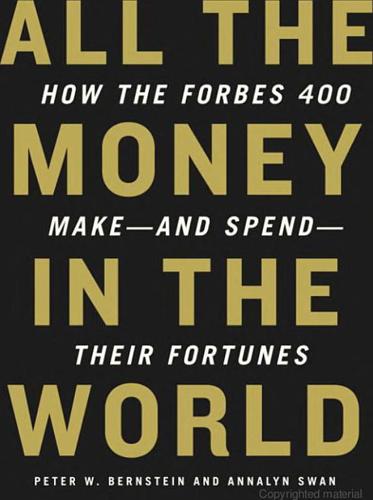
All the Money in the World
by
Peter W. Bernstein
Published 17 Dec 2008
. $0.9 $2.6 Oil, banking Arts, environment Michael & Bloomberg $0.88 $5.3 Bloomberg LP Arts, education, health care Paul Allen $0.87 $16.0 Microsoft Science education, research Bernard Osher $0.8 $0.9('05) Banking Arts, education, medicine Larry Ellison $0.79 $19.5 Oracle Health research John Kluge $0.75 $9.1 Metromedia Libraries George kaiser $0.72 $8.5 Oil, gas Antipoverty Kirk Kerkorian $0.7 $9.0 Investments Humanitarian Bernard Marcus $0.65 $1.9 Home Depot Brain disorders Irwin & Joan Jacobs $0.58 $1.7 Qualcomm Culture Pierre & Pam Omidyar $0.58 $7.7 eBay Microfinance investing Shelby White** $0.5 $0.75('02) Investments Arts, humanities H.F. & Marguerite Lenfest $0.47 $0.8('04) Cable Higher education, arts Thomas Monaghan $0.47 $0.45 Domino's Catholic higher education Frank Sr.& Jane Batten $0.4 $1.4 Landmark Education, Child development Peter Lewis $0.4 $1.4 Progressive Corp.
…
It was all the more impressive, then, that Huizenga, a college dropout who started his business with one used garbage truck, was the man standing in front of them. Think of Forbes 400 members5 and what comes to mind are tycoons such as computer titan Michael Dell, America Online’s Steve Case, eBay’s Pierre Omidyar, and Qualcomm’s Irwin Jacobs—all former winners of Ernst & Young awards, all high-tech billionaires who made fortunes on flashy, brainy businesses. Then there are the media mavens—Rupert Murdoch, Barry Diller, David Geffen—whose boldface names appear regularly in the papers. Huizenga’s fortune, by contrast, derives from a patchwork of low-tech, low-visibility, low-prestige ventures: trash hauling, video rentals, auto sales.
…
Gates has spent $1 billion so far in scholarships to high-school graduates and $1.2 billion to improve high schools, largely by creating some fifteen hundred small high schools in forty states and Washington, D.C. The currently popular notion that small schools perform better than large ones has galvanized the foundations of many other Forbes 400 members, including those of Dell’s Michael and Susan Dell; Wal-Mart’s Walton family; Jerri-Ann and Gary Jacobs (son of Qualcomm founder, Irwin Jacobs); Donald and Doris Fisher, founders of retailer the Gap; and others. But results of spending30 to create smaller schools remain mixed. Graduation rates are up somewhat, according to the Gates Foundation, but math scores are “on par with or lagging behind other schools” in their districts, and—just as the Annenberg Challenge found—duplicating successes is a challenge.
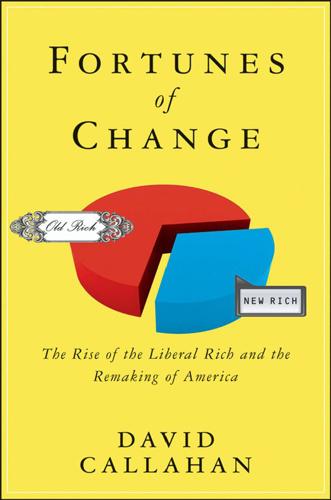
Fortunes of Change: The Rise of the Liberal Rich and the Remaking of America
by
David Callahan
Published 9 Aug 2010
Schmidt’s wife, Wendy, also put $1 million into the campaign. Other Silicon Valley heavyweights kicked in as well, including Terry Semel, then the CEO of Yahoo; the venture capitalist John Doerr; the billionaire and Sun Microsystems cofounder Vinod Khosla; Jeff Skoll, the cofounder of eBay; and Irwin Jacobs, the chairman of Qualcomm. c08.indd 188 5/11/10 6:24:55 AM left-coast money 189 Proposition 87 didn’t fly with voters, but serious Silicon Valley money has continued to flow into environmental causes. Eric and Wendy Schmidt have sunk millions of dollars into groups such as the Natural Resources Defense Council and the Energy Foundation, while Intel cofounder Gordon Moore—as already discussed—is emerging as one of the biggest environmental philanthropists of all time.
…
In 2006, for example, Steve Bing spent $49.6 million backing Proposition 87. This stands as the largest amount of money that any individual has ever spent on a ballot campaign. The campaign also attracted financial support from Google’s cofounders and CEO; Gap chairman Robert Fisher; Nathaniel Simons, the son of hedge fund manager James Simons; Jeff Skoll; Qualcomm chairman Irwin Jacobs; Warner Bros. president Alan Horn; and John Doerr. The effort failed, but that didn’t stop another super-rich environmentalist from backing another clean energy ballot initiative two years later, in 2008. This time, the money came from Peter Sperling, the billionaire son of John Sperling, who made the family fortune in for-profit education by founding the University of Phoenix.
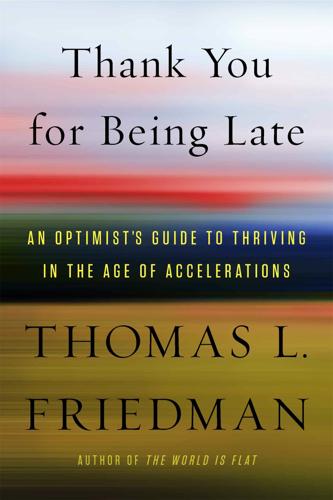
Thank You for Being Late: An Optimist's Guide to Thriving in the Age of Accelerations
by
Thomas L. Friedman
Published 22 Nov 2016
Irwin: The Cell Phone Guy It was wonderful for consumers for all these networking breakthroughs to occur, but someone had to pack them into a phone you could carry in your pocket to get the full frontal revolution—and no individual was more responsible for this mobile phone revolution than Irwin Jacobs. In the pantheon of the great innovators who launched the Internet age—Bill Gates, Paul Allen, Steve Jobs, Gordon Moore, Bob Noyce, Michael Dell, Jeff Bezos, Marc Andreessen, Andy Grove, Vint Cerf, Bob Kahn, Larry Page, Sergey Brin, and Mark Zuckerberg—save a few lines for Irwin Jacobs, and add Qualcomm to the list of important companies you’ve barely heard of. Qualcomm is to mobile phones what Intel and Microsoft together were to desktops and laptops—the primary inventor, designer, and manufacturer of the microchips and software that run handheld smartphones and tablets. And all you have to do is walk through Qualcomm’s museum at its San Diego headquarters and see its first mobile phone—basically a small suitcase with a phone on it made in 1988—to appreciate the Moore’s law journey it’s been on.
…
I am deeply indebted to Doug Cutting from Hadoop and Chris Wanstrath from GitHub for patiently walking me through the evolution of both of their companies and ensuring that I got every fact right. It took multiple visits and follow-ups with both for me to fully understand what they had each helped to create, and I am extremely grateful for their tutoring. Qualcomm’s cofounder Irwin Jacobs did the same on my two visits to his campus. He, his son Paul, and their whole team were enormously generous with their time. I owe a particular thanks to Joe Schuman and Nate Tibbits from Qualcomm for going the extra mile. Gidi Grinstein literally spent hours with me sharing his impressive work on strengthening communities in Israel.

Frommer's Portable San Diego
by
Mark Hiss
Published 2 Nov 2007
At Sher- La Jolla Music Society wood Auditorium, 700 Prospect St., La Jolla. Tickets $20–$95. & 858/459-3728. www.ljms.org. San Diego Symphony In 2002, enduring financial stability arrived for the San Diego Symphony with the announcement of a $120-million bequest by Joan and Irwin Jacobs (founder and CEO of Qualcomm). The gift has allowed the organization to lure top talent, including music director Jahja Ling and principal pops conductor Marvin Hamlisch. The symphony’s home is the former Fox Theatre, a 1929-era French rococo-style downtown landmark, restored and now known as Copley Symphony Hall.
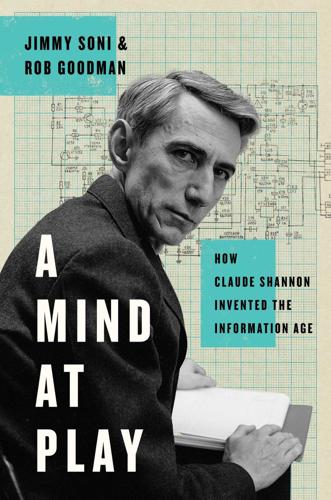
A Mind at Play: How Claude Shannon Invented the Information Age
by
Jimmy Soni
and
Rob Goodman
Published 17 Jul 2017
He would find the simplest example of something and then he would somehow sort out why that worked and why that was the right way of looking at it. Other visitors, though, found themselves occasionally beaten to the punch by a mind that had mapped much of the terrain they were still only beginning to explore. Irwin Jacobs, an MIT student of that era and later the founder of Qualcomm, recalled: “People would go in, discuss a new idea, and how they were approaching it—and then he’d go over to one of his filing cabinets and pull out some unpublished paper that covered the material very well!” * * * Unlike traditional mid-century husbands and fathers, Shannon spent many of his days around the house.
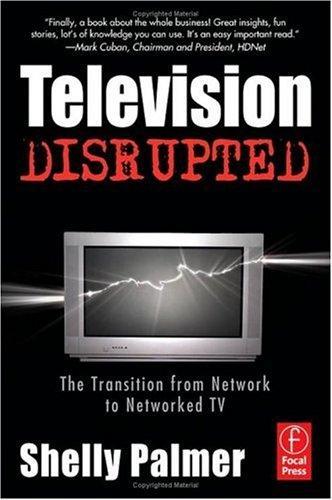
Television disrupted: the transition from network to networked TV
by
Shelly Palmer
Published 14 Apr 2006
QAM Quadrature amplitude modulation (QAM) is the encoding of information into a carrier wave by variation of the amplitude of both the carrier wave and a ‘quadrature’ carrier that is 90° out of phase with the main carrier in accordance with two input signals. QOS Quality of Service Qualcomm Qualcomm is a wireless telecommunications research and development company based in San Diego, California. It was founded in 1985 by Irwin Jacobs and Andrew Viterbi, who previously founded Linkabit. Quicktime A digital video file format developed by Apple. It is often used for short, small segments, and can be played on both Macin-toshes and PCs. QuickTime has been named as the underlying format for the MPEG 4 standard specification.
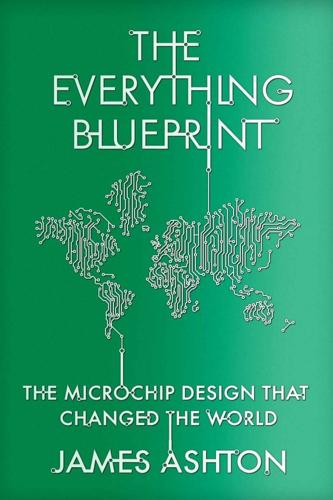
The Everything Blueprint: The Microchip Design That Changed the World
by
James Ashton
Published 11 May 2023
The proposed combination would create the world’s third-largest maker of microchips, behind Intel and Samsung, creating ‘a global communications leader with an impressive portfolio of technologies and products’, Tan affirmed in a statement.3 Whatever bonhomie had been manufactured for the cameras in the White House quickly ebbed. Qualcomm was a national and regional champion and had been rooted in San Diego, California, since its foundation in 1985 by Irwin Jacobs, a one-time professor of computer science and engineering at the city’s university. The company had even put its name to the local sports stadium that had hosted Super Bowls and Major League Soccer. More importantly, Qualcomm (a portmanteau of Quality Communications) was a key developer of 5G technology vital for use in the defence industry, among others, after proliferating the code division multiple access (CDMA) technology standard for radio communications.